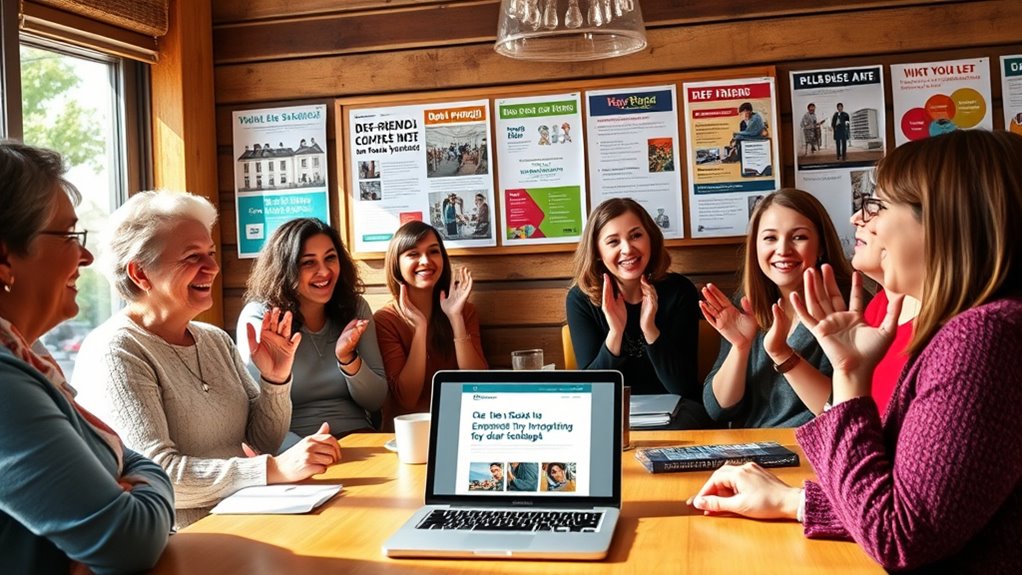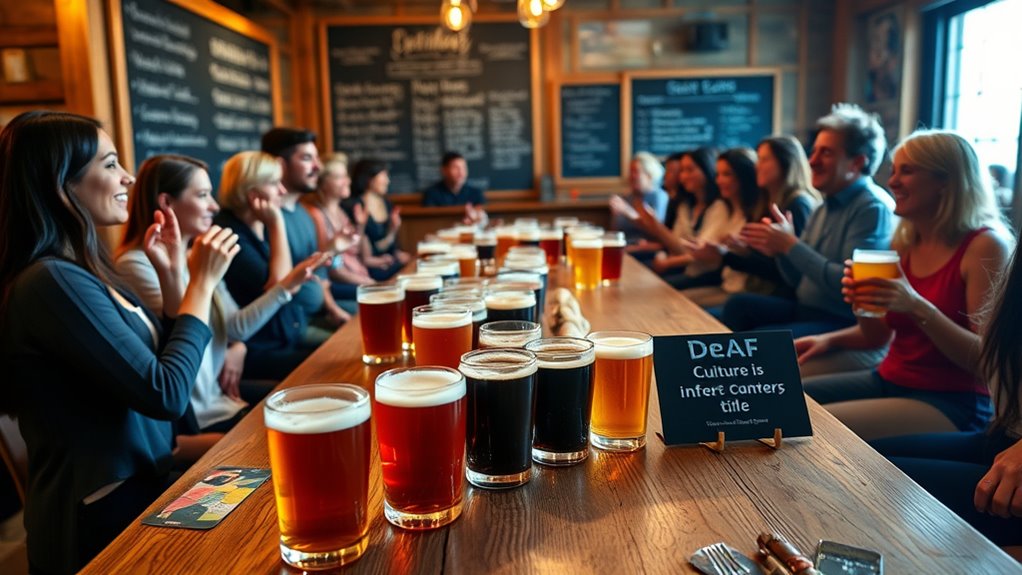To find deaf-friendly jobs, start by exploring specialized job boards like DeafJobWizard and CSDWorks. Network with community organizations such as Nobis Works and DCARA in urban areas that offer resources and connections. Consider industries like culinary and craft beverages that embrace inclusivity. Remember to tailor your applications and seek employers who prioritize accommodations. There’s more to uncover about practical strategies and essential tips to increase your chances of landing a job in this supportive environment.
Key Takeaways
- Utilize specialized job boards like DeafJobWizard and CSDWorks that cater specifically to deaf individuals seeking employment opportunities.
- Connect with vocational rehabilitation agencies for training and support tailored to the unique needs of deaf job seekers.
- Attend networking events hosted by deaf organizations to expand job prospects and make valuable industry connections.
- Explore urban centers with abundant resources and inclusive practices, increasing employment opportunities for deaf individuals.
- Research potential employers for their commitment to reasonable accommodations and inclusive hiring practices before applying.
Deaf Employment Resources Available

If you’re interested in the gourmet food truck scene, there are plenty of resources to help you get started. From vocational rehabilitation agencies that offer training to specialized job boards that cater to your needs, you’ll find support every step of the way. Additionally, understanding budgeting strategies can help you manage the financial aspects of starting your business. Establishing a clear financial settlement time limit can also prevent prolonged financial disputes as you navigate your new venture. Connecting with other deaf individuals in the industry can also open doors and provide valuable insights. Moreover, considering emotional support can be crucial as you transition into a new career path. Additionally, Nobis Works provides essential resources to assist individuals with hearing impairments in their job search. Furthermore, collaborating with vocational rehabilitation agencies can help you access tailored training programs designed to enhance your skills.
Gourmet Food Truck Scene
As gourmet food trucks continue to rise in popularity, many are embracing inclusive practices that create employment opportunities for deaf individuals. Food trucks like The Deaf Chefs and Def Burger are leading the charge, offering apprenticeships and job training. These businesses not only provide a deaf-friendly work environment but also foster community engagement through events that promote cultural exchange. The Deaf Chefs, run by sisters Coco and Mandy, exemplifies this commitment by employing young deaf adults and creating a supportive atmosphere where deaf-led environment is prioritized.
| Benefits | Challenges |
|---|---|
| Accessible menus | Paperwork and compliance |
| Job training programs | Communication barriers |
| Mentorship opportunities | Financial constraints |
| Inclusive workplaces | Marketing and promotion |
| Community support | Infrastructure limitations |
Deaf-Friendly Job Markets

When you’re exploring deaf-friendly job markets, urban centers often stand out for their resources and opportunities. You might also find that underrated community organizations can provide valuable support and connections. Additionally, many urban areas are starting to focus on effective hydration techniques to create a more inclusive work environment. Plus, networking through deaf organizations can open doors to job prospects tailored to your skills. Additionally, it is important to note that employment rates for deaf individuals vary significantly by location, with some states offering more opportunities than others. To enhance your job search, consider leveraging diversified investments to create financial stability while pursuing new career paths. Increasingly, many employers are recognizing the importance of enhanced infrastructure resilience to support diverse work environments, which can benefit deaf individuals in the job market. In fact, companies that prioritize new vehicle technology are often more open to hiring individuals from diverse backgrounds, including those with hearing impairments.
Urban Centers With Resources
Urban centers provide a wealth of resources that create vibrant job markets for deaf individuals, making it easier for you to find meaningful employment. Though challenges like communication barriers exist, many urban companies prioritize inclusivity, providing accommodations and fostering supportive environments. This includes addressing the communication barriers that hinder job performance for Deaf individuals. Additionally, urban centers often have accessible housing options that allow for greater independence and comfort while pursuing your career goals. The presence of disability-friendly employers can greatly enhance job security and satisfaction as well. Furthermore, many organizations in urban centers adopt office alternatives that facilitate effective collaboration among employees. Many employers also offer Retirement Planning benefits to ensure long-term financial security for their employees.
Here’s a snapshot of key urban resources:
| Resource Type | Description |
|---|---|
| Vocational Rehabilitation | Services to aid job preparation and placement |
| Disability-Friendly Employers | Companies committed to hiring deaf individuals |
| Deaf Community Networks | Supportive networks offering job opportunities |
| Assistive Technology | Access to tools that enhance communication |
With diverse job opportunities in technology, healthcare, and education, urban centers are ideal for finding roles that suit your skills and aspirations.
Underrated Community Organizations
Many community organizations play a vital role in creating deaf-friendly job markets, offering support and resources tailored to the needs of Deaf individuals. PRIDE Industries provides essential employment services, including skills assessments and job placements across various sectors. The National Association of the Deaf (NAD) offers valuable resources and job listings specifically for Deaf and hard of hearing individuals. Vocational Rehabilitation Services assist in job training and provide assistive technology. Platforms like CSDWorks and DeafJobWizard specialize in job searches for Deaf individuals. Additionally, many disability-friendly companies actively seek to hire and accommodate Deaf employees, fostering inclusive work environments. These organizations not only help you find jobs but also equip you with the skills needed for career advancement, as there is an abundance of job options available for deaf and hard of hearing individuals in various fields. Furthermore, the increasing demand for cybersecurity professionals has opened up new opportunities for Deaf individuals in tech-related roles. Moreover, the integration of AI tools in recruitment processes enhances the chances of finding suitable positions by optimizing job matching based on individual skills and preferences. Additionally, mental clarity can significantly impact job performance, making it essential for individuals to focus on maintaining cognitive health in their career pursuits. Continuous monitoring of market conditions can also provide insights into emerging job opportunities for the Deaf community.
Network Through Deaf Organizations
While traversing the job market can be challenging, networking through Deaf organizations greatly enhances your chances of success. Organizations like Nobis Works and DCARA offer valuable job training and resume development specifically for the Deaf and Hard of Hearing community. DHHSC provides job placement services through government partnerships, while the National Deaf Center shares insights on employment trends. Additionally, many organizations provide accommodations for communication to ensure a smoother hiring process for deaf candidates. You can also explore professions that suit your skills, such as management, writing, or laboratory technician roles. It’s essential to consider strategic planning for your job search, as it can lead to more effective networking and employment opportunities. Incorporating techniques from auditory processing disorder sound therapy can enhance your communication skills during interviews. Estate planning can also be a critical aspect of your financial preparation as you embark on your career journey. Upgrading your skills through job training programs can further improve your employability. Don’t forget to leverage resources like Google Live Transcribe for communication. By connecting with Deaf job seeker networks and employment specialists, you’ll find support and opportunities that cater to your unique needs, ultimately leading you to a fulfilling job.
Craft Beer Tastings

If you enjoy craft beer, you’ll find tastings are a great way to explore unique flavors and pairings. Artisan flatbreads and toppings can elevate the experience, while regional vineyards and distilleries add another layer to your palate. Plus, culinary workshops and classes often teach you how to enhance your beer-tasting skills. Additionally, participating in tastings with a Beer Taster Professional can provide valuable insights into the quality and complexity of different brews. You might also discover that regional variations in flavors can greatly influence your beer preferences, much like the diverse culinary practices found in Brazilian cuisine. Many of these tastings often feature local artists showcasing their talents, creating a vibrant atmosphere that enhances the overall experience.
Artisan Flatbreads and Toppings
As you plunge into the world of artisan flatbreads, you’ll discover a delightful fusion of flavors awaiting your palate, especially when paired with craft beers. These flatbreads offer an array of toppings, from classic tomato and basil to bold roasted vegetables or savory prosciutto. Each topping creates its unique flavor profile, enhancing the experience. Pair your spicy toppings with a hoppy IPA to cut through the richness, or enjoy earthy mushrooms with a malty porter for a decadent treat. Frozen pizza tasting experiences can inspire your flatbread creations and elevate your culinary adventures. Don’t shy away from customization; mix and match to find your perfect combination. Attend beer and flatbread pairing events to explore new flavors and enjoy exclusive collaborations that celebrate local ingredients and culinary creativity.
Regional Vineyards and Distilleries
When exploring regional vineyards and distilleries, you’ll find a vibrant scene that embraces craft beer tastings alongside traditional wine offerings.
Many of these establishments prioritize accessibility, providing tours with sign language interpreters and visual aids to enhance the experience for deaf visitors. Job opportunities abound in roles like tour guides and event coordinators, allowing you to work in an inclusive environment. Some vineyards and distilleries also host community events designed for diverse audiences, ensuring everyone feels welcome. A special tour for the hearing impaired may be offered during specific events, creating additional inclusive experiences. Training programs may be available to help you learn how to conduct tours or tastings inclusively.
Whether you’re passionate about craft beer or wine, these venues present exciting possibilities for both enjoyment and employment.
Culinary Workshops and Classes
Culinary workshops and craft beer tastings offer an exciting blend of hands-on learning and flavor exploration. In these workshops, you’ll engage directly with cooking techniques while experienced chefs guide you through various cuisines, enhancing your culinary skills. The interactive nature fosters collaboration, making it a fun environment for all. Craft beer tastings not only let you explore diverse flavors but also educate you on brewing processes and food pairings. You can socialize with fellow enthusiasts while enjoying the tasting experience. Many workshops and tastings now provide accommodations for deaf participants, like sign language interpreters and visual aids, ensuring everyone feels welcome and included. Additionally, culinary classes often focus on local ingredients and Maine flavors, further enriching the experience. Research local events online or reach out to community organizations for recommendations on accessible options.
Must-See Sights

When exploring must-see sights, you’ll find historic museums and galleries that cater to your needs. Breathtaking national parks invite you to experience nature in all its glory, while cultural festivals and events celebrate diversity and creativity. Plus, using visual job boards can connect you with opportunities in these exciting locations. For instance, the Deaf Art at the Dyer Arts Center showcases the works of talented Deaf and hard of hearing artists, making it a unique cultural experience.
Historic Museums and Galleries
Although many historic museums and galleries may seem ordinary at first glance, they hold remarkable stories and experiences that resonate deeply with Deaf culture.
You’ll find places like the National Deaf Life Museum at Gallaudet University, which showcases Deaf history through compelling exhibits. Many museums prioritize accessibility, offering ASL-interpreted tours and ASL training for staff. This commitment enhances communication and makes visits more enjoyable. Investing in hiring Deaf individuals not only enriches the workplace but also fosters a more inclusive environment.
Don’t miss the Dyer Arts Center or the Alice Cogswell Heritage House, both honoring Deaf art and pioneers. These spaces foster community engagement and preserve Deaf culture.
Plus, they often create job opportunities in accessibility and education, allowing you to contribute to a vibrant, inclusive environment while sharing your passion for history and culture.
Breathtaking National Parks
Have you ever wondered what makes national parks so breathtaking? With stunning landscapes and diverse ecosystems, these parks draw millions each year. In 2024, U.S. national parks reached a record 331.9 million visits! While the Great Smoky Mountains topped the list, parks like Zion and Yellowstone are also must-see spots. Notably, 404 out of 433 NPS sites reported visitation data, showing the widespread appeal of these natural wonders. Check out the table below for highlights of these breathtaking parks.
| Park Name | 2024 Visits | Notable Features |
|---|---|---|
| Great Smoky Mountains | 12.19 million | Rich biodiversity |
| Zion National Park | 4.94 million | Stunning canyons |
| Yellowstone National Park | 4.74 million | Geysers and wildlife |
Explore these national treasures for unforgettable experiences!
Cultural Festivals and Events
Cultural festivals and events offer vibrant platforms where you can immerse yourself in the rich tapestry of Deaf culture. These gatherings celebrate Deaf identity through sign language poetry, storytelling, and cultural performances, showcasing the creativity of Deaf artists. You’ll find art shows and film screenings that highlight unique perspectives and foster community engagement. Many festivals prioritize inclusivity by educating the public about Deaf culture and providing accessible experiences, like ASL interpretation and sensory-friendly spaces, ensuring that accessibility enhances the experience for all attendees. You’ll also connect with role models and peers, enriching your understanding of heritage. With global participation, these events create opportunities for cultural exchange, ensuring that everyone can fully enjoy the festivities while preserving and celebrating Deaf culture.
Use Visual Job Boards
When you’re searching for Deaf-friendly job opportunities, using visual job boards can be a game changer. Platforms like DeafJobWizard and CSDWorks specialize in listings tailored for Deaf and hard-of-hearing individuals, making your search more focused. Additionally, many companies listed on these platforms prioritize communication access to ensure a smooth application process.
Check out the National Association of the Deaf‘s resources for additional links. Don’t overlook mainstream sites like Indeed, LinkedIn, and Glassdoor, where you can filter for accessibility features. Explore USAJOBS for federal positions that often provide necessary accommodations. Also, consider Idealist for various job sectors.
Practical Tips

When planning your job search, it’s crucial to take into account practical tips that can make the process smoother. Think about how you’ll get there, getting around once you arrive, and the best time to visit potential employers. Additionally, consider reasonable accommodations that may be necessary during your visit to ensure effective communication with potential employers. Also, don’t forget to explore where to stay and local etiquette to guarantee a positive experience.
Getting There
Getting your foot in the door of the job market can feel challenging, especially for deaf and hard-of-hearing individuals, but practical strategies can make the journey smoother.
Start by tailoring your resume for each application, emphasizing your unique communication skills and problem-solving abilities. Remember to invest time in updating your resume for targeted roles to increase your chances of success.
Network strategically through social media and professional platforms to connect with potential employers.
Continuously build your skills to enhance your employability.
Research companies that prioritize diversity and inclusion, and don’t hesitate to reach out to deaf organizations for support.
Utilize job websites like DeafJobWizard and access government schemes for practical assistance.
Getting Around
Maneuvering public transport can feel overwhelming, but with the right tools and strategies, you can seamlessly get around. Utilize apps like Moovit and CityMapper for real-time updates and route planning. Look for SMS alerts and information screens for essential announcements. In ride-sharing, use features like text communication and pre-set destinations to ease interactions. Additionally, many cities have implemented SMS alerts to provide real-time notifications about transport status during disruptions, enhancing your travel experience.
| Transport Mode | Accessibility Features | Benefits |
|---|---|---|
| Public Transport | SMS alerts, visual signals | Real-time updates |
| Ride-Sharing | Text communication | Easier driver interaction |
| Air Travel | Visual briefings | Better safety understanding |
| Bus/Train Navigation | Google Maps | Accurate route tracking |
With these tools, you can confidently navigate your surroundings and focus on your job search.
Best Time to Visit
Understanding the best time to visit for job hunting can greatly enhance your chances of success. Generally, aiming for the first quarter of the year is smart, as companies roll out new budgets and hiring plans. Spring and fall are particularly beneficial due to major career fairs and networking events that can connect you with potential employers. If you’re targeting seasonal industries like retail or hospitality, plan your visit around their peak hiring times during summer and winter holidays. Keep an eye on economic trends, as they can impact job availability. Additionally, consider reaching out to Disability Employment Advisors who can assist you in finding opportunities that cater to your needs. Finally, remember that the rise of remote work offers more flexibility, allowing you to focus less on specific locations and times for job searching.
Where to Stay
When planning your stay, consider accommodations that prioritize accessibility for deaf travelers. Look for hotels with visual alerts for doorbells and fire alarms, and make sure they offer accessible communication methods like email or text messaging. Staying near areas with a strong deaf community can enhance your experience. Regular assessments of public venues for accessibility can help ensure that accommodations meet your specific needs. Check online reviews for insights on deaf-friendly amenities and services. It’s also crucial to confirm that staff are trained to communicate effectively with deaf guests. Opt for places equipped with technology like video conferencing or messaging apps. Additionally, explore budget-friendly options, long-term rentals, and travel insurance to smooth your trip. Booking in advance helps secure accommodations that meet your specific needs.
Local Etiquette
Finding the right accommodations is just the start; knowing how to interact respectfully in local settings is equally important.
Always speak clearly and make certain your face is visible for lip-reading. Avoid covering your mouth, and use gestures to enhance communication. When you need to get someone’s attention, a gentle tap or wave works wonders.
Maintain eye contact to engage effectively, and be direct in your conversations. If you’re using an interpreter, address the deaf person directly. Understanding individual preferences is key to ensuring effective communication.
Respect Deaf culture by treating everyone equally and learning basic signs. Be mindful of personal space and the collective nature of interactions.
Finally, don’t forget that humor and exaggerated expressions can enrich your conversations.
Pro Tip
Maximize your job search by tailoring your resume to each position you apply for. Highlight relevant skills and experiences that align with the job description. Additionally, be aware that higher unemployment rates among deaf individuals mean that you may need to showcase your unique strengths to stand out in the application process.
Next, network strategically; connect with potential employers via social media to gain insights about the industry. Research companies known for their commitment to diversity and inclusion, ensuring they provide necessary accommodations for employees with hearing loss.
Continuously build your skills to stay competitive, and explore job boards specifically designed for deaf and hard-of-hearing individuals.
Consider roles like social media manager, sign language interpreter, or web designer, which often require minimal auditory input.
Finally, utilize assistive technologies to support your communication needs during interviews and in the workplace.
Frequently Asked Questions
What Qualifications Are Needed for Deaf-Friendly Jobs?
To qualify for deaf-friendly jobs, you need specific education or training, like a bachelor’s degree for certain roles.
Communication skills, particularly in sign language, are vital, especially for positions like interpreters. You should also develop technical skills relevant to your field, such as software proficiency.
Being adaptable and comfortable with assistive technology is essential. Don’t forget to assess your skills, prepare your resume, and practice for interviews to enhance your chances.
How Can I Disclose My Hearing Impairment During Interviews?
Disclosing your hearing impairment during interviews can feel like stepping into a lion’s den, but it doesn’t have to be intimidating.
You can start by mentioning your needs at the end of the interview, evaluating the company culture first. Emphasize your strengths and skills, showing how you can excel despite challenges.
If needed, suggest accommodations like interpreters or captioning, ensuring clear communication. Confidence is key—your abilities shine brighter than any perceived limitation!
Are There Remote Job Options for Deaf Individuals?
Absolutely, there are numerous remote job options for you as a deaf individual.
Remote work settings offer roles like chat operators, writers, and graphic designers that don’t require voice communication. You can find flexibility and create a comfortable work environment tailored to your needs.
Companies actively seek diverse talent, ensuring equal opportunities. Plus, many remote jobs don’t require prior experience, making it easier for you to jump in and start your career.
What Industries Are Most Inclusive for Deaf Employees?
Did you know that 15.7% of Deaf individuals work in manufacturing? This industry, along with IT, design, and creative arts, provides inclusive environments for Deaf employees.
In these fields, visual skills are prioritized, reducing reliance on verbal communication. Education and ASL interpreting careers also thrive, allowing you to use your language expertise.
How Can I Improve My Communication Skills for the Workplace?
To improve your communication skills for the workplace, start by practicing clear speech and maintaining eye contact.
Use open-ended questions to encourage dialogue, and don’t hesitate to ask for clarification when needed.
Familiarize yourself with visual aids and written communications to bolster understanding.
Additionally, consider taking sign language classes or participating in Deaf awareness training to enhance your interactions with colleagues.
Engaging actively in conversations will also build your confidence and effectiveness.
Conclusion
In your quest for a fulfilling future, don’t forget to explore diverse deaf-friendly domains. By tapping into targeted resources and connecting with compassionate companies, you’ll cultivate a career that celebrates your unique talents. Seek out supportive spaces, from craft beer tastings to vibrant venues, where you can thrive. With determination and the right direction, you’ll discover delightful opportunities that align with your passions. Embrace the journey, and let your aspirations soar in the workplace!











